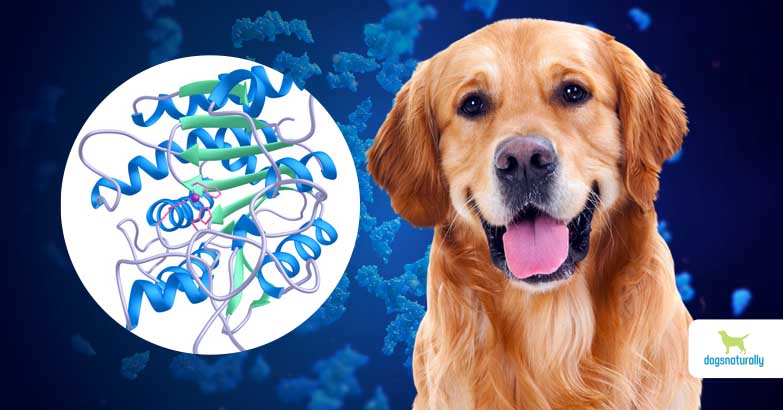Have you considered giving digestive enzymes to your dog? Or perhaps you think he doesn’t need them. As far as you know, the food’s going in one end and out the other, so everything’s fine, right?
Well … not always. In fact, your dog likely needs help absorbing nutrients from the food he eats.
There are several reasons for this. So here are some facts about digestive enzymes for dogs … and when to use them.
What Are Digestive Enzymes?
Your dog naturally produces digestive enzymes in his body. Digestive enzymes aren’t the only enzymes your dog’s body makes … but they’re some of the most important ones for his health.
Digestive enzymes are proteins that help break down food molecules into smaller pieces. That fuels his body by helping it take in nutrients more efficiently.
Enzyme names all end in “-ase.” The main types of digestive enzymes dogs need are…
- Protease, which breaks down proteins into amino acids so the body can use them.
- Amylase breaks down starches into smaller carbohydrate molecules.
- Lipase helps digest fats in the diet.
- Cellulase breaks down fiber from plants and grains. Your dog doesn’t naturally have this enzyme in his body. (I’ll talk more about this on this later.)
Digestive enzymes mainly come from your dog’s pancreas. As food travels through your dog’s small intestine, the pancreas releases digestive enzymes. That’s when they break down the various food components so your dog’s body can absorb them.
So … if your dog’s body makes all these digestive enzymes, why would he need supplements?
Why Your Dog Needs Digestive Enzymes
Well … there are some health issues that need support from extra digestive enzymes. And we’ll get to those in a bit.
But even your healthy dog could have a digestive enzyme deficiency.
Enzyme Deficiency
Dr Edward Howell pioneered digestive enzyme research in the early 20th century. He observed that the body becomes enzyme deficient over time … and that happens because we cook our food.
He found that the lack of enzymes from cooked food causes shortened life span in people and animals, due to …
- Lowered resistance to stress and disease
- Enlarged pancreas – strained by having to produce more enzymes
- Reduced size of other organs like the brain
He summarized his findings very eloquently with his famous Enzyme Nutrition Axiom:
“The length of life is inversely proportional to the rate of exhaustion of the enzyme potential of an organism. The increased use of food enzymes promotes a decreased rate of exhaustion of the enzyme potential.”
What he meant, in plainer English, was that we use up the enzymes our bodies make. So eventually we deplete our enzyme resources, which shortens our lives. But using food enzymes slows this process.
And it’s true for your dog too.
One reason for an enzyme deficiency is your dog’s diet. In theory your dog’s body produces enough enzymes to digest all the food groups … carbohydrates, protein and fat. But because of modern diets, that’s not always the case.
What Holistic Vets Say
Most dogs eat cooked diets … whether kibble, canned or even home-made.
Veterinarian Dr PJ Broadfoot said in a 2018 paper:
“Supplemental enzymes are needed to replace those destroyed by cooking and processing food. Processing and cooking at any heat of approximately 118°F to 129°F (48°C to 54°C), for as few as three minutes, can destroy virtually all enzymes, which results in very little pre-digestion taking place in the stomach. Thus, what’s left of the food mass enters the small intestine largely undigested. This puts the pancreas and other organs of the endocrine system under tremendous stress, since they have to draw reserves from the entire body in order to produce massive amounts of the proper enzymes.”
Jean Hofve DVM agrees. In a 2013 paper about Digestive Enzymes she made the case for routine digestive enzyme supplementation for all pets.
“Digestive enzymes can be used for pancreatic and GI issues, but are also beneficial for healthy patients eating heat-processed pet foods.”
Dr Hofve goes on to say:
“… recent research shows that in humans with gastrointestinal disease, but more importantly, even in normal individuals, supplementation with digestive enzymes substantially increased digestion in the lumen of the small intestine, and improved the bioavailability of proteins and carbohydrates. Especially in view of the highly processed diet that most of our pets are eating, this implies that most healthy adult dogs and cats can benefit from a digestive enzyme supplement. Digestive enzymes help pets digest and assimilate food better–any food.”
So, raw feeders, don’t stop reading! Dr Hofve said “any food!” This is important for your dog too. Even raw fed dogs often need extra enzymes.
The way you feed and raise your dog creates some situations where digestive enzymes can really help your dog.
Factors In Enzyme Deficiency
- If your dog eats food with starchy ingredients (like kibble and even some canned, freeze dried or dehydrated foods) … he may not produce enough enzymes to break it down. Amylase helps digest starches. But dogs don’t naturally make much amylase, because in the wild, they wouldn’t eat starchy foods.
- Processed foods are “dead” foods. The high temperatures and pressures used to make kibble destroy any live enzymes that were in the raw ingredients. Natural enzymes are destroyed at temperatures above 118oF. And some kibbles are heated to 180o Celsius. That’s 356oF – more than 3 times the temperature that kills enzymes!
- Canned food cooking temperatures are also high enough to destroy enzymes. And canned food is truly “dead” because it’s completely sterile.
- If you’re a raw feeder, you know that raw is the best food for your dog. And that raw food contains live enzymes. In the wild, dogs would also get some extra enzymes from the guts of their prey. But most of us don’t feed guts to our domestic dogs. So your dog’s body has to work harder to produce enzymes.
- Vaccines, pharmaceutical drugs, dead foods and fluoridated water can all lower your dog’s ability to make its own enzymes. And over time, this can cause an enzyme deficiency.
- And to make matters worse, as your dog ages his body produces fewer enzymes naturally. So the deficiency is compounded. Your dog’s body can’t keep up! This means all senior dogs are likely have an enzyme shortfall.
Enzyme Deficiency Affects The Whole Body
So … even your healthy dog can deplete his own digestive enzyme sources. And that can affect other vital processes in his body, like …
- Immune system
- Waste and toxin elimination
- Hormone regulation
- Gallbladder function
You’ll notice the gallbladder in that list. It might seem like an small, insignificant organ. But it’s important in digestion … because it produces bile to help digest fat. If the gallbladder isn’t working efficiently, your dog won’t have enough bile in his digestive system to break down fats.
So how can you tell your dog needs more digestive enzymes?
Symptoms Of Digestive Enzyme Deficiency
Watch for these signs your dog may need some digestive enzyme support:
- Burping and farting
- Regurgitating undigested food
- Diarrhea
- Constipation
- Bloating
- Smelly breath
- Acid reflux
- Tummy rumbling or gurgling
- Abdominal pain or cramping
- Foul-smelling stools
- Undigested food in stool
If you recognize your dog in these symptoms, digestive enzymes could make a big difference!
Besides just using up his own enzyme supply … your dog might have a specific health issue that these supplements can help with.
Digestive Enzymes For Health Issues
Here are some chronic health issues that need extra digestive enzyme support.
EPI (Exocrine Pancreatic Insufficiency)
EPI is a serious condition that stops your dog’s pancreas from producing digestive enzymes. In severe cases it can lead to starvation, because your dog can’t absorb nutrients.
Signs of EPI include ravenous hunger, weight loss, or chronic diarrhea. …
Your vet can diagnose EPI using a test called TLI – trypsin-like immunoreactivity test.
Dogs with EPI often develop small intestinal bacterial overgrowth (SIBO). This is because with EPI there’s undigested food passing through the intestine. This feeds bacteria in the small intestine, allowing them to grow there (instead of the colon, where they usually live).
Managing EPI and SIBO
Even conventional vets will prescribe pancreatic enzymes and recommend you feed raw pancreas for EPI. So a digestive enzyme supplement that includes pancreas can help the condition. Pancreatic enzymes are best given with food … and they should be moistened and sit at room temperature for 20 to 60 minutes before feeding.
Feeding raw pancreas also helps with EPI. 1-3 oz of raw pancreas can replace 1 tsp of enzyme powder. Never cook it as heat will destroy the enzymes.
Digestive enzymes can also relieve SIBO symptoms. By helping break down food, they often reduce problems like bloating, gas, constipation or diarrhea. And they’ll improve nutrient absorption.
PRO TIP
If your dog has SIBO, give soil-based probiotics. This type of probiotic forms spores that will help the probiotics arrive intact at the large intestine and colon … so they won’t feed the bacteria in the small intestine like other probiotics.
RELATED: EPI and other digestive diseases in dogs …
Chronic Pancreatitis
Pancreatitis means “inflammation of the pancreas” and it can be a chronic condition.
Important Note: This means chronic pancreatitis. Acute pancreatitis needs emergency care by your vet. Your dog may need to be hospitalized for an acute pancreatitis attack.
The signs of chronic pancreatitis include:
- Lethargy and lack of appetite
- Occasional vomiting or diarrhea
- Stomach pain (restlessness)
When pancreatitis is chronic, these symptoms may come and go. They may not be as severe as acute pancreatitis. But don’t ignore these recurring signs and let them get more serious. Chronic pancreatitis can progress into diabetes or EPI. So if you see these symptoms regularly, talk to your holistic vet.
In the meantime, feed your dog a healthy diet and keep him lean. Give regular exercise … and don’t over-vaccinate! Vaccination is a big factor in inflammatory conditions.
Among other supplements, your dog’s inflamed pancreas needs digestive enzymes. If the pancreas isn’t working properly, it’s not going to produce the digestive enzymes your dog needs.
RELATED: Read more detail about pancreatitis in dogs …
Other Digestive And Malabsorption Issues
Digestive enzymes can also help with several other digestive and malabsorption issues. They’re a good addition to the diet of dogs with digestive issues like:
- Leaky gut syndrome
- Inflammatory bowel disease (IBD)
- Acid reflux
RELATED: 5 steps to restore gut health …
Chronic Health Issues
Dogs with food intolerances, allergies, frequent ear infections or skin problems should also benefit from digestive enzymes. Keep in mind these problems often stem from poor gut health … so building a healthy gut is the first step in resolving them.
In fact, just about any chronic health issue can be an indication your dog isn’t getting all the nutrients he needs. For example, some research shows even liver problems can stem from nutrient deficiencies … and supplemental digestive enzymes can help.
Think about the chain of events in your dog’s body. Lack of digestive enzymes leads to lack of nutrients. This creates poor gut health, which can cause systemic inflammation … and chronic disease.
The truth is, most chronic health problems will improve with better absorption of nutrients. And that means your dog needs digestive enzymes!
So … how do you go about choosing digestive enzymes for your dog?
How To Choose Digestive Enzymes For Dogs
First of all, don’t use a human digestive enzyme supplement. Your dog has very specific enzyme needs, so buy a product made for dogs.
Here are some good ingredients in digestive enzyme supplements for your dog.
Pancreas
There are two reasons to include pancreas in your dog’s digestive enzyme supplement.
First, the pancreas creates most of the digestive enzymes your dog needs. So … because those enzymes are in the pancreas … supplementing pancreas delivers important digestive enzymes like protease, amylase and lipase.
Second, pancreas can bolster the pancreas’s own ability to make digestive enzymes.
In Traditional Chinese Veterinary Medicine and other herbal medicine … there’s a principle of feeding the organ you want to strengthen. The pancreas is the organ that produces most digestive enzymes in your dog, so feeding pancreas supports and fortifies the pancreas.
Papain
Papain is the enzyme contained in papaya fruit. It helps with digestion of proteins. In fact, papain is used as a meat tenderizer … so that tells you it can break down meat! It can support your dog’s immune system as well. And papain is anti-parasitic, so can help your dog eliminate worms. Papain is used in medicine to treat pain and inflammation.
Bromelain
Bromelain comes from pineapple stem, fruit and juice. It breaks down protein and is also known for its ability to reduce pain and swelling, especially in the nose, sinuses and gums. It can help heal burns and may help arthritis as well as muscle soreness.
Betaine HCL
Betaine HCL is a natural form of hydrochloric acid. Hydrochloric acid is produced in the digestive tract, where it creates pepsin … an enzyme that breaks down protein. Betaine HCL boosts production of hydrochloric acid in the stomach. It can help digest proteins and stimulate intestinal enzymes. Research shows betaine boosts digestive enzymes as well as intestinal microbiota.
Cellulase
Dogs don’t have natural cellulase. But many of them need it … especially if they eat kibble. Cellulase helps your dog break down fiber. Most kibbles contain fibrous fillers like cellulose (which is basically sawdust). So a digestive enzyme containing cellulase is a must to ease your dog’s digestion. It’ll also help your dog digest grains and other plant material in his food.
Cellulase can also help dogs with yeast. Microorganisms like bacteria and fungi create a protective layer called biofilm. Biofilm can be a good thing. But it can also help yeast hide from yeast treatments … as well as your dog’s immune system. Yeast cell walls are made of cellulose. So cellulase can help break down the cellulose and remove the yeast’s defenses.
Cellulase has another benefit: it helps control blood sugar levels.
Invertase
Invertase is an enzyme found in yeast and pollen. It’s important for digestive health. It separates sugar into glucose and fructose, which helps with digestion of starchy carbohydrates. This moves sugars out of the digestive tract before they can ferment and cause problems. Invertase also has antiseptic and antibacterial properties and can boost immunity too. It’s said to slow the aging process and even cause physical rejuvenation.
(One strange bit of trivia is that invertase is used in the candy industry to make chocolates with fondant fillings!)
Ox Bile
Remember earlier we said the gallbladder as an important part of your dog’s digestive system?
The liver produces bile, which is stored in the gallbladder. The gallbladder releases bile after a meal, to break down fats into fatty acids for digestion. Bile also helps with blood sugar metabolism and elimination of waste products in the body.
But if the gallbladder doesn’t produce enough bile, giving ox bile can provide it. Ox bile also helps control bacteria overgrowth. So it can be very useful in managing SIBO in the small intestine.
Some people call ox bile the ultimate digestive enzyme. It works like a detergent that dissolves fat to make it more digestible.
DNM RECOMMENDS: Four Leaf Rover offers Digest, a natural supply of digestive enzymes with pancreas to support pancreas function. Organic broccoli sprout powder supports the liver and soil based probiotics help maintain a normal gut flora. Buy Digest now >>
How To Give Your Dog Digestive Enzymes
Again, always buy a digestive enzyme supplement made specifically for dogs. Follow the instructions on the label for correct dosing.
Digestive enzymes are best given with food. You can add a little water or broth if needed.
And if your dog has EPI, it’s best to moisten any pancreatic enzymes you give. Let the moistened powder sit for 20-60 minutes before feeding.
Remember that heat kills enzymes. So never add them to hot food. And don’t heat up food after adding enzymes.
Your dog shouldn’t have any side effects … other than improved digestion!
But if he gets any gas or loose stools at first, just reduce the dose a little until his body adjusts to the new digestive support.
You can also boost your dog’s natural digestive enzymes by feeding enzyme-rich foods.
Foods With Digestive Enzymes For Dogs
Try some of these enzyme-rich foods:
- Fruits like bananas, mangos, papayas, pineapple, kiwi
- Ginger
- Honey
- Apple cider vinegar
- Fermented veggies
Summary Of Digestive Enzyme Benefits
Give digestive enzymes to dogs who …
- Eat kibble, canned or other cooked starchy foods
- Get allergies, food sensitivities or skin issues
- Have EPI, malabsorption or other digestive problems
- Have any chronic health issues, including joint problems like arthritis
- Are older
- Drink fluoridated water (always try to give your dog spring or filtered water)
When your dog’s body absorbs nutrients better, he’ll benefit from better digestive health. And that means stronger immune function and disease resistance and less chronic health problems.…
Always keep digestive enzymes in mind, no matter what health issue your dog has.
References
Howell E. Enzyme Nutrition: The Food Enzyme Concept. New Jersey: Avery Publishing Group, 1985
Howell E. Food Enzymes for Health & Longevity. Lotus Press 2014.
Villaverde C, Manzanilla EG, Molina J, Larsen JA. Effect of enzyme supplements on macronutrient digestibility by healthy adult dogs. J Nutr Sci. 2017;6:e12. Published 2017 Apr 18.
Watson P. Chronic pancreatitis in dogs. Top Companion Anim Med. 2012 Aug;27(3):133-9. doi: 10.1053/j.tcam.2012.04.006. Epub 2012 Jun 23.
Paula Jo (PJ) Broadfoot DVM. Digestive Enzymes In Dogs And Cats. Innovative Veterinary Care. June 13 2018.
Jean Hofve DVM. Digestive Enzymes. Innovative Veterinary Care. February 20, 2013.
Medhekar R. The First Quantitative Evidence Proving The Efficacy Of Supplemental Enzymes. 2004.
Parada J, Aguilera JM. Food microstructure affects the bioavailability of several nutrients. J Food Sci. 2007 Mar;72(2):R21-32. doi: 10.1111/j.1750-3841.2007.00274.x. PMID: 17995848.
Edward J Hall MA VetMB PhD DECVIM-CA. Malabsorption Syndromes In Small Animals. Merck Veterinary Manual, June 2020.
Timoleon S. Rallis, DVM, PhD, K Adamama-Moraitou DVM, Exocrine Pancreatic Insufficiency In Dogs And Cats: An Update. WSAVA World Congress Proceedings 2004.
Kolac C et al. “Oral bioavailability of proteolytic enzymes. European journal of pharmaceutics and biopharmaceutics. 1996, vol. 42, no4, pp. 222-232 (68 ref.)
Xiu-an Zhan et al. Effects of fluoride on pancreatic digestive enzyme activities and ultrastructure in young pigs. Fluoride 2005;38 (3):215-219, Research report 215.
Wang, H.; Li, S.; Fang, S.; Yang, X.; Feng, J. Betaine Improves Intestinal Functions by Enhancing Digestive Enzymes, Ameliorating Intestinal Morphology, and Enriching Intestinal Microbiota in High-salt stressed Rats. Nutrients. 2018;10:907.
Matos, Carla MD et al. Nutrition and Chronic Liver Disease, Journal of Clinical Gastroenterology. 2002 Nov-Dec;35(5):391-397.
Jyotsna Chandra et al. Biofilm Formation by the Fungal Pathogen Candida albicans: Development, Architecture, and Drug Resistance. J Bacteriol. 2001 Sep;183(18):5385-5394.











